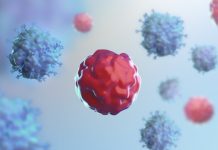
Researchers from the Indian Institute of Science (IISc) have discovered that a drug commonly used to treat asthma and allergies – montelukast – can effectively block a crucial SARS-CoV-2 protein.
The study identified that montelukast could attach to and inhibit a protein produced by the SARS-CoV-2 virus, mitigating its viral replication in human cells. Montelukast has been prescribed for over 20 years and is approved by the US Food and Drug Administration (FDA). The drug is predominantly employed to reduce inflammation caused by asthma, hay fever and hives.
The novel research discovered that montelukast strongly binds to one end of the SARS-CoV-2 protein called Nsp1 – one of the initial viral proteins released inside the human cells. This protein can bind to ribosomes located in our immune cells and shut down the synthesis of proteins required by the immune system, subsequently making it weaker. The researchers believe that targeting Nsp1 can potentially mitigate the damage caused by COVID-19.
Tanweer Hussain, Assistant Professor in the Department of Molecular Reproduction, Development and Genetics (MRDG), IISc, and senior author of the study, said: “The mutation rate in this protein, especially the C-terminal region, is very low compared to the rest of the viral proteins. Since Nsp1 is likely to remain largely unchanged in any variants of the virus that emerge, drugs targeting this region are expected to work against all such variants.”
The study findings are published in eLife.
Repurposing drugs for COVID-19
The Indian Institute of Science team utilised computational modelling to assess the performance of over 1,600 FDA-approved drugs at binding to Nsp1, narrowing these down to a dozen medications that included montelukast and an anti-HIV drug called saquinavir.
Mohammad Afsar, former Project Scientist at MRDG, currently a postdoc at the University of Texas at Austin, and the first author of the study, said: “The molecular dynamic simulations generate a lot of data, in the range of terabytes, and help to figure out the stability of the drug-bound protein molecule. To analyse these and identify which drugs may work inside the cell was a challenge.”
How did montelukast perform?
To assess montelukast, the research team cultured human cells that specifically produced Nsp1 in the lab and then treated them with montelukast and saquinavir separately, discovering that montelukast was able to rescue the inhibition of protein synthesis by Nsp1.
Afsar explained: “There are two aspects to consider: one is affinity, and the other is stability. This means that the drug needs to not only bind to the viral protein strongly but also stay bound for a sufficiently long time to prevent the protein from affecting the host cell. The anti-HIV drug (saquinavir) showed good affinity, but not good stability.”
However, the team identified that montelukast bound strongly and stably to Nsp1, enabling the host cells to perform normal protein synthesis. The researchers then analysed the effect of the drug on live viruses, discovering that montelukast effectively reduced viral numbers in infected cells in the culture.
Hussain concluded: “Clinicians have tried using the drug, and there are reports that said that montelukast reduced hospitalisation in COVID-19 patients, but the exact mechanisms by which it works still need to be fully understood.”
The researchers are aiming to collaborate with chemists to investigate if montelukast’s structure can be modified to make it more potent against SARS-CoV-2 and are also continuing to search for other drugs with robust antiviral activity.








